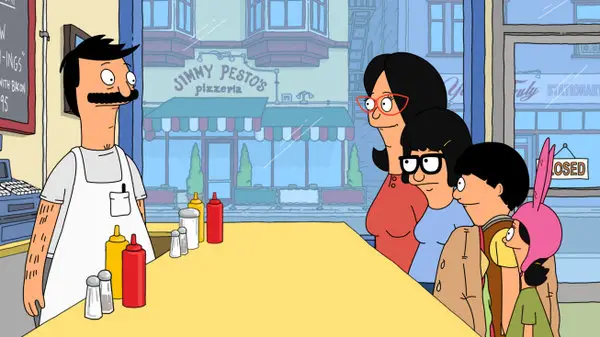An animated comedy about a family that owns a burger restaurant does not sound phenomenal, but it is easily one of the best shows — animated or not — on television today, a pleasant surprise considering Fox’s “Animation Domination” has been dwindling in promise.
The edgy, but often malicious comedic style of “Family Guy” got old pretty fast, and as for “The Simpsons,” well, they are still on TV, technically, but Fox really needed a new show to become a breakout hit, and they got it with “Bob’s Burgers.”
No one expected the show to be so great, and it is clear that “Burgers” found its success by being one of a kind. It is hilarious without being mean, its jokes do not need to always involve something sexual or inappropriate, and its main characters are all so utterly distinctive that it is truly something audiences have never seen before.
The characters’ differences are one of the key components of the show’s greatness. They are all so loveably strange in their own right that viewers can’t help but find some of themselves in each one.
Tina Belcher, the awkward, boy obsessed teenager, is not mocked for her weirdness, but rather beloved for it.
On “Family Guy,” Meg Griffin is the butt of the joke. On “Bob’s Burgers,” Tina Belcher is making the joke, or at least setting it up. We don’t laugh at Tina, we laugh with her. If she is made fun of it is done so lovingly, not with scorn.
Such a stark difference not only provides a component to the show unparalleled in modern animated adult comedy, but also tremendous hilarity that’ll make your stomach hurt in no time. What makes Tina so great of a television character is how she’s embraced for her weirdness and openly allowed to be strange
Show creator Loren Bouchard does a phenomenal job in this respect because comedy can often become subservient to what gets laughs: cruelty. See “Family Guy” creator Seth McFarlane for prime examples of this trend.
Meg Griffin is constantly insulted for not being pretty, smart or popular. One of the most awful and plainly unfunny jokes from “Family Guy” comes when Meg and her mother, Lois, are shopping in a store. Meg comes out of the dressing room to show her mother the pair of jeans she was trying on, and as the joke of the scene, a woman sets herself on fire upon seeing what is deemed to be the ghastly sight of Meg in jeans.
Now, of course, it is almost certain that McFarlane and his writers in no way condone the severe bullying Meg suffers in real life, but it remains that their style of comedy is the least nuanced of all. If you have to resort to incredibly awful insults as a means of making your show hilarious and well liked, then your talent as a comedian should not be glorified but rather questioned.
Insults do have a place in comedy, but not if they are not funny. Peter Griffin and the rest of the family constantly belittling Meg by telling her to shut up, calling her ugly or fat and otherwise just being awful is not comedy, it’s just bullying. Perhaps this seems like a humorless response to one of the most popular animated comedies of the past decade, but there is more to comedy than making fun of someone. The better comedians in the world can be described as such because of their ability to be funny without insulting everyone around them.
And this is why “Bob’s Burgers” is one of the best comedy shows of all time. The worst insult that the Belcher family has said to Tina is that she is “awkward,” which she definitely is.
But she is never told to shut up just for talking, not once is she called fat or ugly, and her character exudes confidence in her own personhood. She describes herself as a “smart, strong and sensual woman,” and she is portrayed with loads of self-acceptance.
America’s favorite animated family has always been “The Simpsons,” and rightfully so. But as the show prepares to begin its 28th season, the Belchers should be recognized as a worthy replacement. While “Bob’s Burgers” does not have the same sentimentality that “The Simpsons” does, the amusement factor of the two is equal.
While a lot of animated comedy relies on dirty humor and fart jokes, though they do use such humor at times, both “Bob’s” and “The Simpsons” never rely solely on such wit.
“The Simpsons” is great at showing what a real, actually healthy familial relationship should look like, and “Bob’s Burgers” does the same. The Simpsons and Belchers are different from one another but still the same. They are families that love one another and try the best to make each other feel good, and they are hilarious in their missteps without needing to be inappropriate or offensive.
On the scale of humor, “Family Guy” represents the absolute lowest level. It is gross, unimaginative and dull. Of course, most of McFarlane’s comedy is much of the same, so it does not come as a surprise. But it is time we recognize the true talent it takes to write something like “Bob’s Burgers,” in comparison to the relative easiness and clear laziness that comes with “Family Guy” and its toilet humor.
Another wonderful thing about “Bob’s Burgers” is that it is absolutely hilarious without being offensive. It needs not push the envelope as a means of getting an audience, as it has found an adoring fan base by being completely different. Much like “The Simpsons,” it follows a dysfunctional family as they navigate the world one hilarious occurrence at a time. Over time, the show has even added musical numbers and performances to its shows.
The idea of musical numbers in animated comedy is nothing new (see some of the best of all time in the “See My Vest” or “Monorail” episodes of the “The Simpsons”), but the topics of the songs in “Bob’s Burgers” are so strange and lovely.
While it would be easy to rely on the lazy humor of a 13-year-old boy and make “Bob’s” a sure hit, the writers have instead made the program’s style of quirky hilarity embody everything that comedy should be. Every character, from Bob to Linda’s cat-loving sister Gail, represents something different and real. Such talent is rare in the world of sitcom writing—especially of the animated variety—and so the creators of “Bob’s Burgers” need and deserve the recognition as some of the all-time greats.


















[…] Check out what else Grimalidi has to say: https://studybreaks.com/culture/situating-bobs-burgers-amongst-pantheon-animated-family-greats/ […]